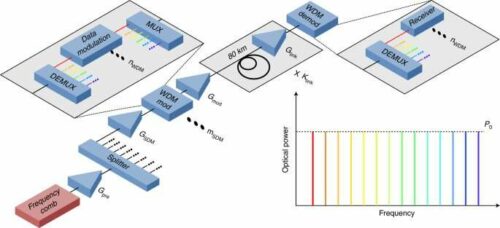A team of researchers has developed a photonic chip that is capable of handling nearly two petabits of data per second

The Internet has become a basic necessity for every individual as it makes our lives easy, fast, and simple. But the use of the internet requires a large amount of data transfer. Hence, a team of researchers has fabricated a single chip for sending 1.84 petabits of data per second via a fiber-optic cable over 7.9 km. The chip developed by researchers with members from several institutions in Denmark, Sweden, and Japan is based on the use of photonics rather than electronics. The technology implemented in their chip first splits an incoming data stream (from a laser) into 37 individual lines that travel across individual threads in a fiber cable. But before sending, the data in each of the 37 streams was split into 223 individual chunks, each corresponding to a unique part of the optical spectrum. This ensures the transfer of huge amounts of data.
This process forms a frequency comb, transmitting data in different colors through the fiber cable. This approach quickly transfers huge amounts of data and prevents the data streams from interfering. The researchers then enclosed their chip into an optical processing device, which they describe as about the size of a matchbox—they describe the result as a “massively parallel space-and-wavelength multiplexed data transmission” system.
The researchers combined their device with another device that fed it multiple channels of data. On the other end, they connected a fiber cable that stretched for nearly 8 kilometers, where it met with another device that measured the amount and quality of the data received. The researchers illustrated that adding their new device to the internet would not require any new transmission media; the standard fiber cables currently in use are compatible.
Click here for the Published Research Paper






